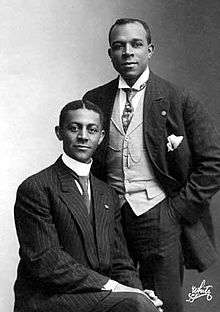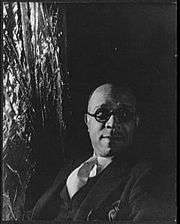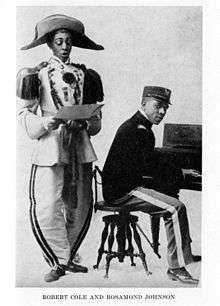J. Rosamond Johnson


John Rosamond Johnson (August 11, 1873 – November 11, 1954),[1] most often referred to as J. Rosamond Johnson, was an American composer and singer during the Harlem Renaissance. Johnson is most notable as the composer of the hymn "Lift Every Voice and Sing" which has come to be known in the United States as the "Negro National Anthem". His brother, the poet James Weldon Johnson, wrote the lyrics of the famous piece. It was first performed live by 500 Black American students from the segregated Stanton School (elementary/middle/junior high-level), Jacksonville, FL, in 1900.[2] The song was published by Joseph W. Stern & Co., Manhattan, New York (later the Edward B. Marks Music Company).[3]
Biography
He was born on August 11, 1873. He was the son of Helen Louise Dillet, a native of Nassau, Bahamas, and James Johnson. John's maternal great-grandmother, Hester Argo, had escaped from Saint-Domingue (now Haiti) during the revolutionary upheaval in 1802, along with her three young children, including (John Rosamond Johnson's grandfather), Stephen Dillet (1797-1880). Although originally headed to Cuba, their boat was intercepted by privateers and they were brought to Nassau, Bahamas instead. There they permanently settled. Stephen Dillet was the first man of color to win election to the Bahamian legislature in 1833 (ref. Along this Way, James Weldon Johnson's autobiography).
Johnson was trained at the New England Conservatory and then studied in London. His career began as an interesting public school teacher in his hometown of Jacksonville, Florida. Travelling to New York, he began his show business career along with his brother and Bob Cole. As a songwriting team, they wrote works such as The Evolution of Ragtime (1903). Among the earliest works by the group, this was a suite of six songs of "Negro" music. They produced two successful Broadway operettas with casts of black actors: Shoo-Fly Regiment of 1906 and The Red Moon of 1908.[4][5][6] Johnson also performed in them. He played a Tuskegee soldier that enlists in the Spanish American War in The Shoo Fly Regiment and portrayed African American Plunk Green opposite Abbie Mitchell’s Minnehaha, a mixed Indian/black woman, in The Red Moon. [7] These performances went beyond theatre. Rosamund, alongside his brother and Cole, evoked a political presence in their inclusion of other races in their musicals.[8] In The Red Moon, Cole and Johnson broke racial lines as they included a love scene between Rosamund’s Green and Mitchell’s Minnehaha. This spotlight on Native Americans was so well received that Rosamund was inducted as a ‘sub-chief’ into the Iroquois tribe of Montreal’s Caugnawago Reservation.[9]
Cole and the Johnson brothers also created and produced several "white" musicals: Sleeping Beauty and the Beast in 1901, In Newport in 1904, and Humpty Dumpty in 1904. Johnson would also collaborate to create Hello Paris with J. Leubrie Hill in 1911.
Johnson was active in various musical roles during his career. He toured Vaudeville and, after Cole's 1911 death, began a successful tour with Charles Hart and Tom Brown. In London, he wrote music for a theater review from 1912 to 1913 serving a long residency. After returning to the United States, New York's Music School Settlement for Colored — founded by the New York Symphony Orchestra's David Mannes — appointed him as director where he served from 1914 to 1919.
With his own ensembles, The Harlem Rounders and The Inimitable Five, he toured as well, and performed in Negro spiritual concerts with Emmanuel Taylor Gordon, including Aeolian Hall in Manhattan.[10]
The London production of Lew Leslie's Blackbirds of 1936 engaged Johnson as musical director. During the 1930s, Johnson also sang the role of Frazier in the original production of Gershwin's Porgy and Bess, taking roles in other dramas as well. He reprised his role as Frazier on the 1951 studio recording of Porgy and Bess.
As an editor, he collected four important works. The first two of these song collections he compiled along with his brother James: The Book of American Negro Spirituals (1925) and The Second Book of Negro Spirituals (1926). In addition, Johnson edited Shoutsongs (1936) and the folksong anthology Rolling Along in Song (1937).

He died on November 11, 1954. his widow died in 1969.[11]
Musical works

- Shoo-Fly Regiment (1906), Broadway operetta
- The Red Moon (1908), Broadway operetta
- Sleeping Beauty and the Beast (1901), musical
- My Castle On The Nile, song (1901)[12]
- My heart's desiah is Miss Mariah (1901), song[13]
- In Newport (1904), musical
- Humpty Dumpty (1904), musical
- Mr. Lode of Koal (1909), musical
- Come Over Here (1912), musical
- "The Maiden with the Dreamy Eyes", song
- "Didn't He Ramble", song
- "Li'l Gal", song
- "Since You Went Away", song
- "Lift Every Voice and Sing", song
- "The Siberian Dip" (1911), ragtime instrumental
See also
Notes
- ↑ Black Past
- ↑ Audio recording, Atlanta Music Festival.
- ↑ Edward B. Marks Music Company.
- ↑ Johnson, James Weldon (1991) [Knopf, 1930], Black Manhattan, Da Capo Press, p. 109.
- ↑ Krasner, David (1998), Resistance, Parody and Double Consciousness in African American Theatre, 1895–19, Palgrave Macmillan, pp. 141–42.
- ↑ Abbott, Lynn; Serof, Doug (2007), Ragged but Right, University Press of Mississippi, p. 75.
- ↑ Seniors, Paula Marie (2009). Beyond Lift Every Voice and Sing: The Culture of Uplift, Identity, and Politics in Black Musical Theatre. The Ohio State University Press. pp. 61, 116.
- ↑ Seniors, Paula Marie (2009). Beyond Lift Every Voice and Sing: The Culture of Uplift, Identity, and Politics in Black Musical Theatre. The Ohio State University Press. pp. 64–65.
- ↑ Seniors, Paula Marie (2009). Beyond Lift Every Voice and Sing: The Culture of Uplift, Identity, and Politics in Black Musical Theatre. 126: The Ohio State University Press.
- ↑ "Sing Negro Spirituals. J. Rosamond Johnson and Taylor Gordon Applauded in Aeolian Hall.". New York Times. November 22, 1926. Retrieved 2014-12-13.
J. Rosamond Johnson and Taylor Gordon gave their first New York recital at Aeolian Hall last evening. Their program of negro spirituals included several that were new to ...
- ↑ "Mrs. J. Rosamond Johnson, Composer's Widow, Is Dead". New York Times. January 28, 1969. Retrieved 2014-12-13.
Mrs. Nora E. Floyd Johnson, widow of J. Rosamond Johnson, composer, author, actor and singer, died Sunday at her home at 437 West 162d Street. She was ...
- ↑ Johnson, James Weldon; Cole, Bob; Johnson, J. Rosamond (1901). My castle on the Nile. New York: Jos. W. Stern and Co. Retrieved 20 September 2014.
- ↑ Johnson, James Weldon; Cole, Bob; Johnson, J. Rosamond (1901). My heart's desiah is Miss Mariah. New York: Jos. W. Stern and Co. Retrieved 20 September 2014.
References
- Southern, Eileen. The Music of Black Americans: A History. W. W. Norton & Company; 3rd edition. ISBN 0-393-97141-4
- Yenser, Thomas (editor), Who's Who in Colored America: A Biographical Dictionary of Notable Living Persons of African Descent in America, Who's Who in Colored America, Brooklyn, New York, 1930-1931-1932 (Third Edition)
- Podcast on James W. Johnson <iframe src="http://player.vimeo.com/video/27594631?byline=0&portrait=0" width="400" height="300" frameborder="0" webkitAllowFullScreen mozallowfullscreen allowFullScreen></iframe>
External links
- The J. Rosamond Johnson Papers at Yale University Music Library
- Free scores by J. Rosamond Johnson at the International Music Score Library Project